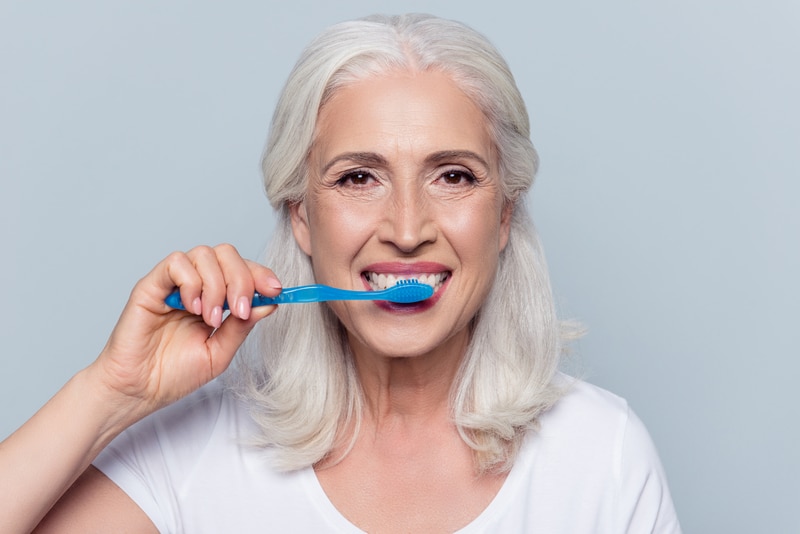Oral Health Over 55


Did you know that your mouth changes as you age? You may encounter oral health problems after age 55 that you didn’t previously have. Studies show that tooth decay and especially gum disease are very common in people over 55. You’ve had your teeth for longer, those teeth tend to shift and go crooked, and oral health problems are easier to get. Find out what to expect after age 55 and what you can do about it!
Oral Hygiene Is a Must
The American Dental Association recommends brushing your teeth at least twice a day to remove decay-causing plaque. They also recommend flossing at least once a day, if not more, to further prevent tooth decay. Tooth decay is also known as ‘cavities” and it’s something that over 90% of people get. The National Institutes of Health states that tooth decay is the most prevalent chronic disease among children and adults.
The age group that’s hit the hardest is people over age 55. Children also have a high prevalence for tooth decay, but it’s usually heaviest in the baby teeth that will fall out. However, the older you get, the longer you have your teeth. Oral health can change over time and can get worse as a person’s teeth age. Years of wear and tear and exposure to plaque can cause frequent problems with tooth decay and oral health diseases. This is why it’s so important to follow a strict oral hygiene routine.
Brush your teeth every single day and floss them too. Brush with a soft-bristled brush and fluoride toothpaste after every meal to help your teeth last as long as possible. Sometimes, people don’t learn these basic recommendations until later in life, which leads to many oral health conditions.

Oral Health Changes Over 55
Did you know that your oral health can change after age 55 even though you are spectacular with oral hygiene practices? Your teeth are incredibly durable, as they are made up of about 96% of solid mineral. However, even the toughest materials like the teeth can break down over time. If you have had dental work done for past cavities, don’t expect the work to last forever.
After 10-20 years, fillings, custom teeth, veneers and more will have to be remade as you age. Keep seeing the dentist throughout those years, as tooth decay can develop under the surface of an old filling. There are other points you want to be aware of such as dry mouth, which is common in people over age 55. The teeth shift with age, they become worn and may turn gray or yellow, and your risk for gum disease increases.
Avoiding Gum Disease Problems
Gum disease is one of the biggest problems you want to be aware of. This disease is painless, so you want to watch for the telltale signs of it. You make plaque from sugars in the foods you eat mixed with mouth bacteria. That plaque coats your teeth and causes decay. It also sits along your gum line, irritating your gums. Your gums want to get away from acidic plaque, so they pull back, which is called “gum recession”.
Gums also become more red, swollen and will start to bleed easier, especially when flossing. Look for these signs often and strive to keep the teeth free of plaque so you can avoid gum recession. Mushy gums will prevent you from being able to get dentures or dental implants that can restore your smile.
Shifting Teeth As You Age
Many children and teens wear braces, but at least 1/4th of people who straighten their teeth are adults. Even if you’ve had orthodontic treatment, your smile can still become crooked as you age. Wear a retainer throughout the decades or get permanent ones placed behind your teeth. Why?
Your mouth experiences a natural shift in its size and shape as you age. That shifting and growth can cause some people’s mouths to become slightly smaller, pushing the teeth into one another. If you notice your teeth turning somewhat or becoming crooked overtime, that is what’s happening. Stop the shift and correct your smile once more through orthodontic treatment, such as Invisalign.

Keeping a White Smile
Have you noticed that the elderly tend to have teeth that are more yellow or gray? There are different layers of the teeth and one of those inside layers is called the dentin. It is hard, but somewhat softer than the outer tooth enamel. Your tooth enamel gets wear and tear over the years and will start to thin out. When it thins, the inner dentin starts to show through, making your teeth look yellower or grayish. Teeth whitening at our office can help restore a smile once more if you notice this is happening to your teeth.
See the Dentist Often
Dry mouth is another oral health problem, which is usually a side effect of many medications. If you are on medication of any kind and feel like you are thirsty often, see if it is what you’re prescribed! The more dry your mouth is, the less saliva you have. Saliva is vital to oral health over 55 and throughout life because it keeps your mouth bathed in mineral-containing liquid. The minerals get in your saliva when you eat certain foods (like dairy products) and build up your teeth. Saliva also helps wash away food and particles that decay your teeth.
You never want dry mouth or you can also expect to start having problems with tooth decay, gum disease, bad breath and more. If you don’t know if your medication causes dry mouth, talk to your doctor. If you want to avoid oral health problems, come into our office frequently for exams and cleanings. Seeing the dentist often is vital to keeping great oral health over 55. To schedule your exam, call Dr. Ania’s office today at 303-443-0998!


